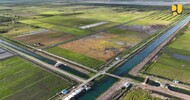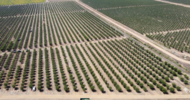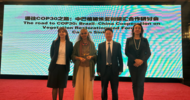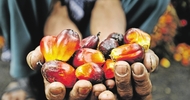"Today, the Oromo issue is not hidden from the world leaders and stakeholders. However, it is being ignored. The Meles regime is selling Oromo land on world market, although this government does not have the right to sell Oromo land."
- Gadaa.com
-
25 February 2010
There is something amazingly patronising in the way Payne claims that Emergent has ‘adopted’ a Mozambican village of 3,000 people and hired its citizens to clear 2,000 acres of land to farm it with her firm.
- Agriprods
-
18 February 2010
As interest in transnational land acquisition for food production grows, the importance of legal customary tenure recognition becomes more apparent.
Ethiopia's potential can be maximized only if we Ethiopians are the producers and sellers of our own agricultural products. What Meles Zenawi is doing now is putting this upside down. He made our potential buyers the sellers of our commodity.
- Ethiomedia
-
03 December 2009
If all these land deals will be beneficial to Pakistan in the long run, why is the government refusing to divulge the details of what is the citizens’ common property?
The large-scale cross border land grabs of late, following the realization that “free trade” is not a reliable basis for food security, should be stopped as an unsustainable response which can only exacerbate the problem of hunger, say IUF members in Asia-Pacific
- Asian Food Worker
-
15 October 2009
Oman has decided to appoint a specialist
company to prepare the Sultanate's national strategy for food security.
- Times of Oman
-
14 September 2009
The craze for land grabbing grows out of speculation on future prices. Only the poor are the net losers.
- Daily Star
-
03 August 2009
"Our message is clear: it is not up to the G8 to set development strategies and programmes for Africa."
AFD has taken the initiative of studying the possibility of creating an investment fund. This fund would make equity investments in responsible companies that invest in African agriculture.
As world population expands, the demand for arable land should soar. At least that's what George Soros, Lord Rothschild, and other investors believe.
It is not clear whether a strategy is in place to ensure that part of the food produced by the rich food importers farms will be sold locally.
- Business Day
-
08 June 2009
The outsourcing of food has suddenly become a very big business. Richard Ferguson, a Europe-based analyst for the Japanese investment bank Nomura, calls what is going on now the “third great wave” of outsourcing after manufacturing in the 1970s and 1980s and information technology in the 1990s and 2000s. In his exhaustive 319-page report, he talks about the future of farming in terms of 1 million-hectare operations.
- Asia Sentinel
-
03 May 2009
With their huge populations, China and India exert an unparalleled force on world food markets. They are looking abroad as it becomes more difficult for them to be self-sufficient -- and the increasing demand often has disastrous consequences across the globe.
- Der Spiegel
-
28 April 2008
In 2013, mammoth US investment company TIAA-CREF gave $5 million to the University of Illinois to fund a research center, branded with the company’s name, that would explore the financial niche of farmland investment.
- Illinois Newsroom
-
16 November 2021
The University of Iowa Faculty Senate voted 42 to 7 to pass a resolution calling on the university to hold the financial services provider TIAA accountable for its investments in global farmland.
- ActionAidUSA
-
28 April 2021
Controversial hedge fund tycoon Crispin Odey invested more than US$170m into one of Brazil’s most damaging agribusinesses despite it deforesting large areas and receiving numerous environmental fines
- Global Witness
-
07 May 2020
The Financial Times reported this week that TIAA-CREF is developing a new “investment vehicle” that will bet the retirement funds of millions of American on the rising price of farmland around the world.
South Korea has just leased half of all the arable land in Madagascar according to the Financial Times. This has stirred quite a debate in the Malagasy blogosphere about land sovereignty and economic development.
- Global Voices
-
23 November 2008
UN Agency IFAD is robbing poor farmers and farming communities of their land and livelihoods, leaving them destitute, and handing over their wealth for plunder by foreign corporations and profiteering financiers.
- The Ecologist
-
19 February 2015
Palm oil is cheap because it’s produced by a global industry built on land grabbing, human rights abuses and environmental devastation.
Report assesses the financial relationships of 17 companies involved in land grabbing, human rights abuses or environmental pollution with 17 selected Swiss banks and institutional investors since January 2011.
- Bread for All
-
06 November 2014
Some liken farmland investment to real estate and infrastructure 20 years ago.
- Economist
-
03 January 2015
A small but growing number of the world's wealthy are shoring up their portfolios with investments in forestry and farmland in an effort to take the sting from losses in more traditional assets as the financial crisis trundles on.
Negotiations between Chinese Export-Import Bank and the Government of the Ukraine include discussion of its involvement in the financial operation of the land market in the Ukraine.
Mineks has withdrawn from Vision3, the strategic alliance between three major Gulf banks to bring a $9 billion investment trust to Turkey, particularly in the Southeastern Anatolia Project, which hit the rocks when the banks were affected by the continued spiral of the financial crisis.
- Today's Zaman
-
03 December 2009
Carbon credits and net-zero pledges are fuelling a new round of farmland buying by billionaires and pension funds that will undermine real climate action.
Rural land produced some of the best investment returns in Europe since the financial crisis began five years ago, appreciating by 51 percent across England
Some projects aimed at increasing food production in Asia have been dropped or delayed amid the financial crisis, notes a new report by IRRI and the Asia Society.
- Wall St Journal
-
26 September 2010
The financial collapse of a project by UK-based Sun Biofuels shows how the development dream can quickly turn into a nightmare for local people.















